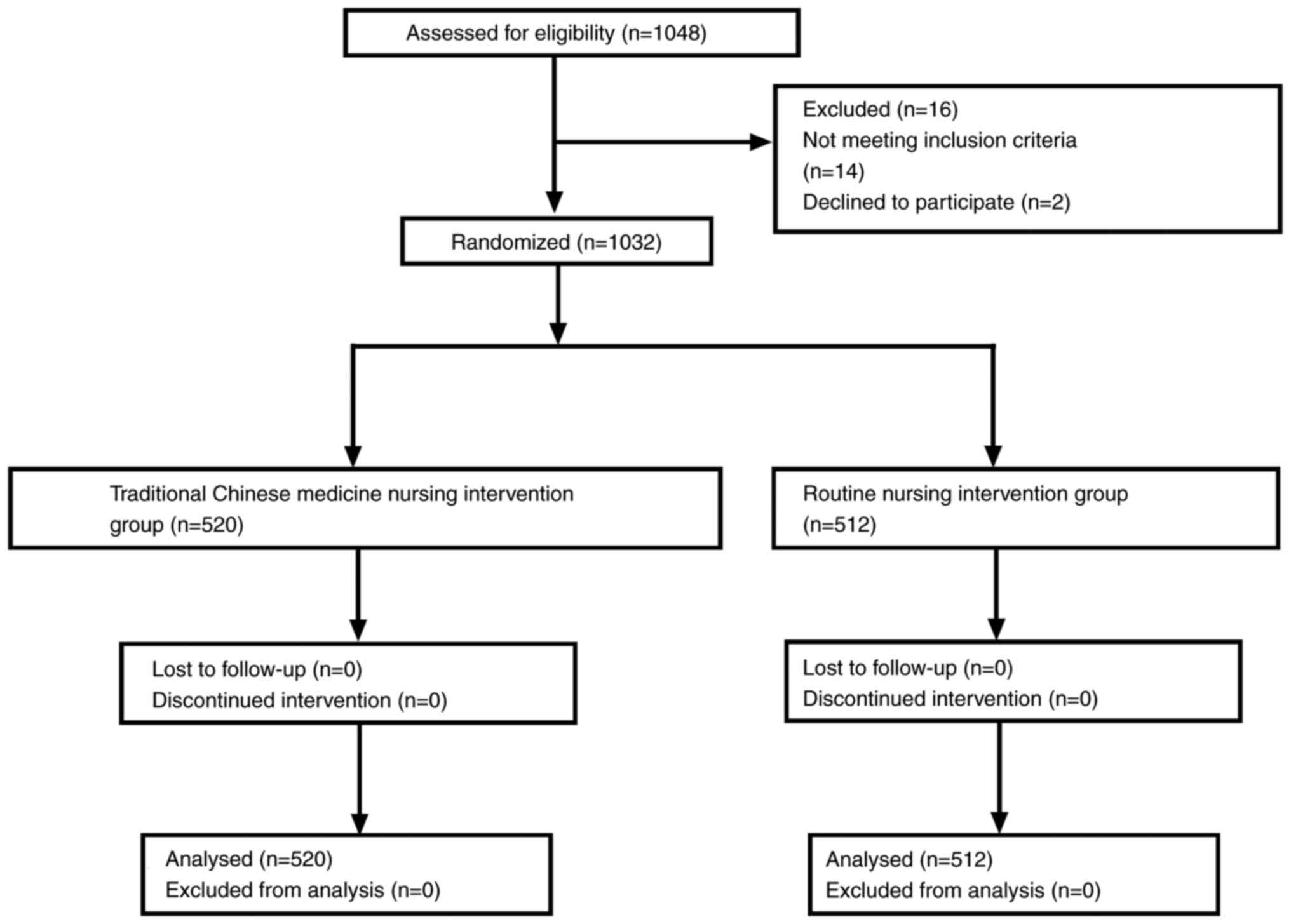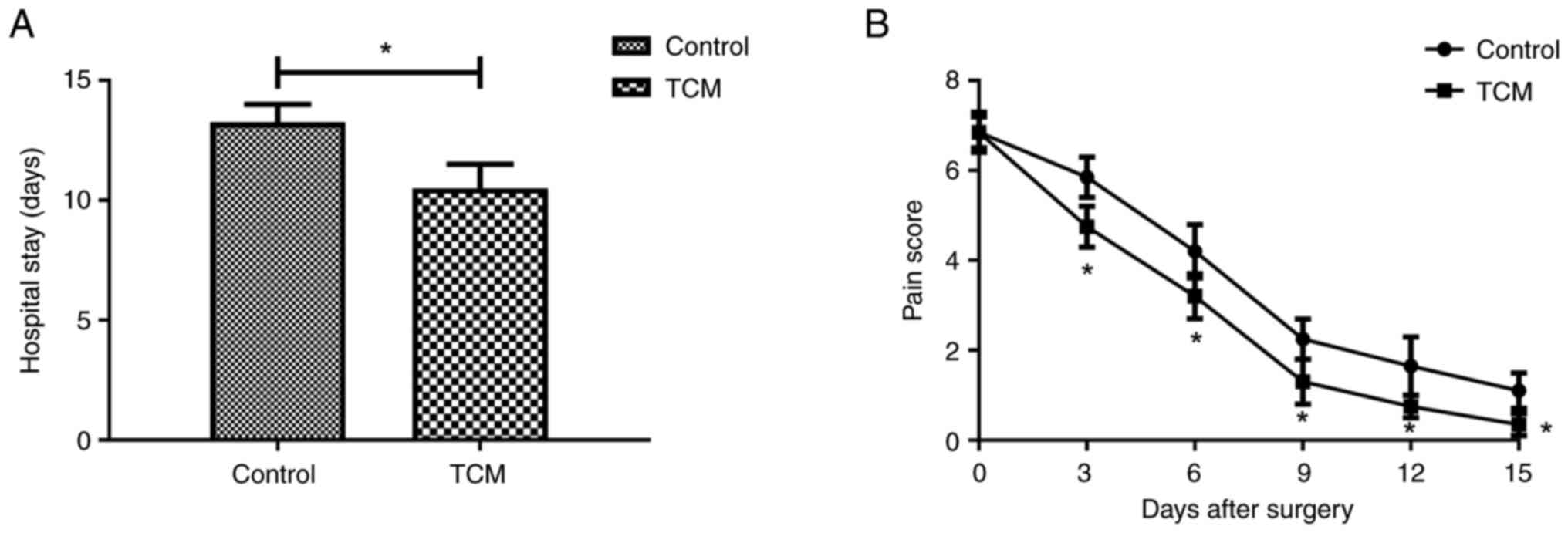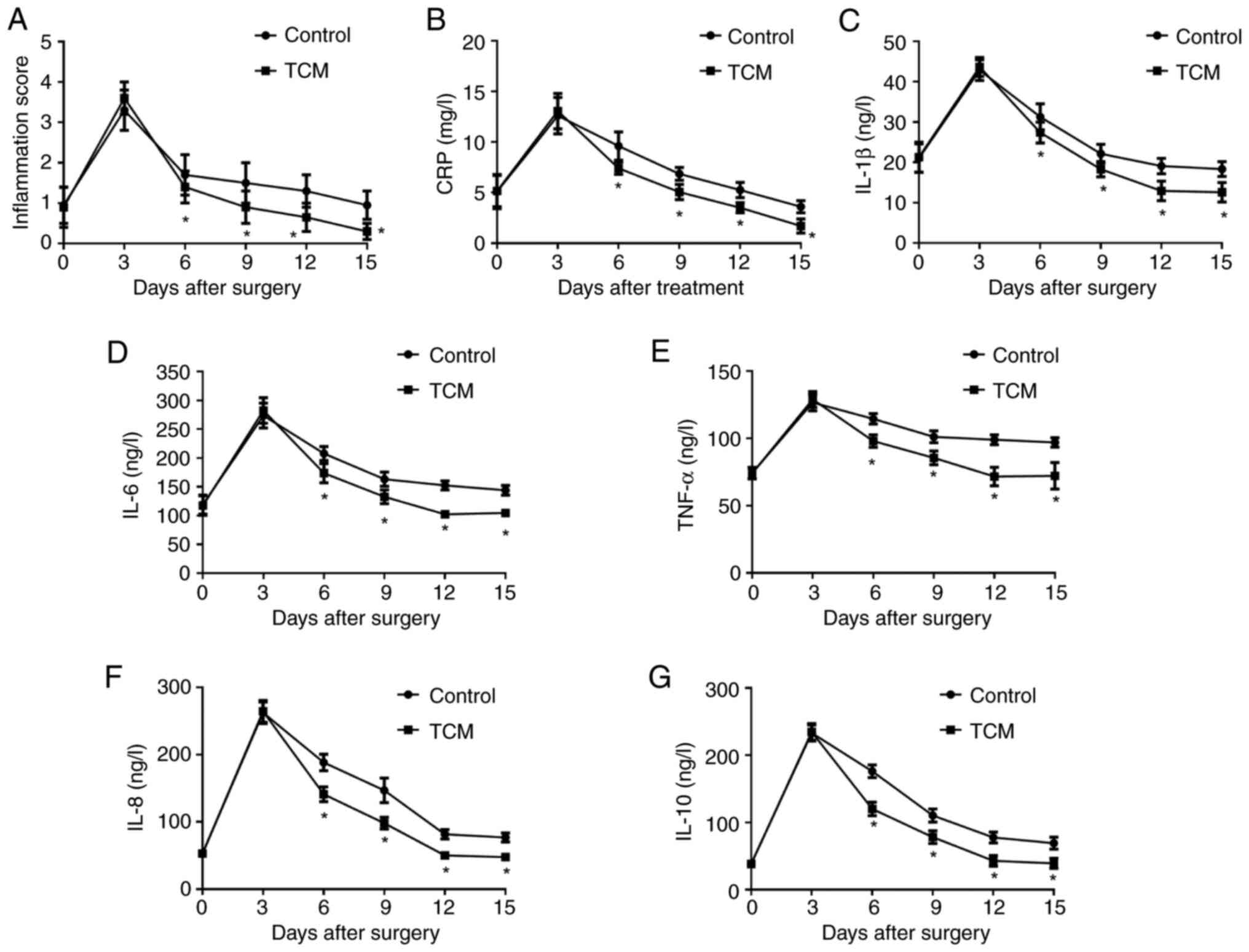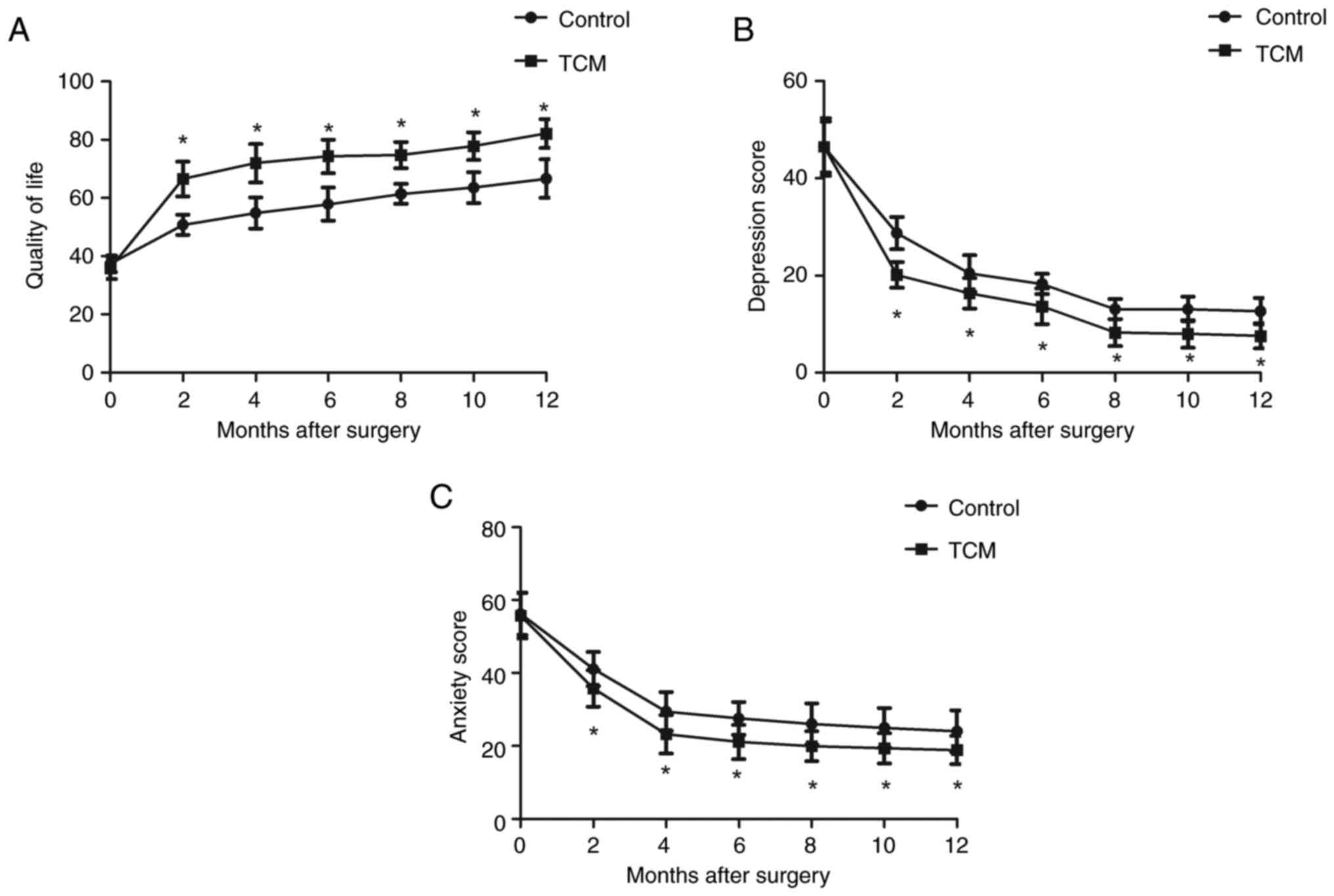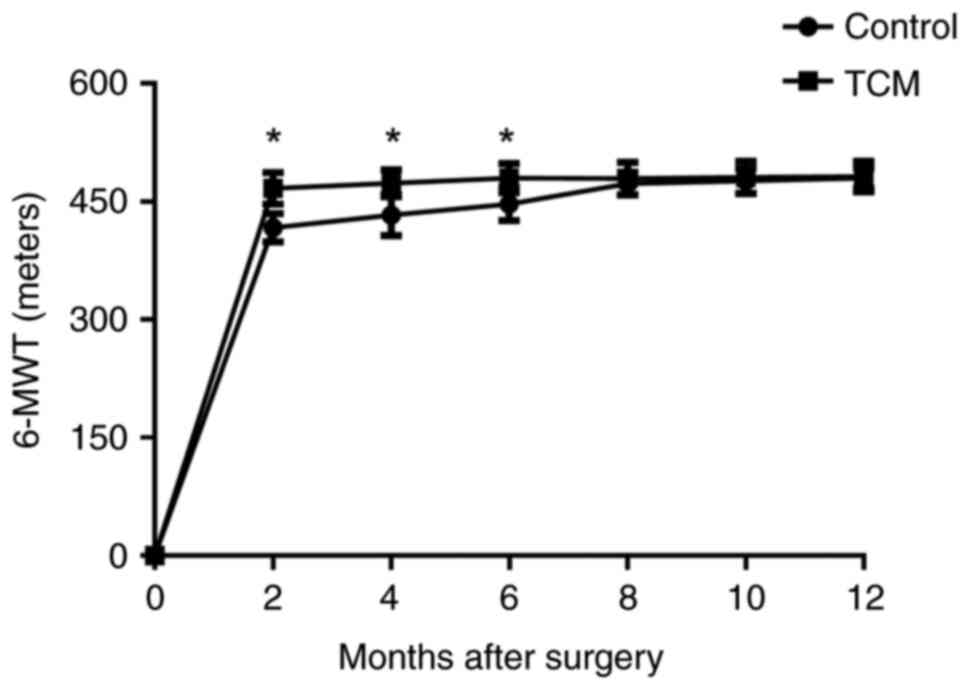|
1
|
Prabhu A, Mishra D, Brandl A and Yonemura
Y: Gastric cancer with peritoneal metastasis-A comprehensive review
of current intraperitoneal treatment modalities. Front Oncol.
12:8646472022. View Article : Google Scholar : PubMed/NCBI
|
|
2
|
Aoyama T, Yoshikawa T, Ida S, Cho H,
Sakamaki K, Ito Y, Fujitani K, Takiguchi N, Kawashima Y, Nishikawa
K, et al: Effects of perioperative eicosapentaenoic acid-enriched
oral nutritional supplement on the long-term oncological outcomes
after total gastrectomy for gastric cancer. Oncol Lett. 23:1512022.
View Article : Google Scholar : PubMed/NCBI
|
|
3
|
Zhang B, Zhao ZQ and Zhang W: A nomogram
to predict the survival of gastric cancer patients who underwent
radical gastrectomy in west China. Asian J Surg. 45:2928–2929.
2022. View Article : Google Scholar : PubMed/NCBI
|
|
4
|
Pang HY, Zhao LY, Wang H, Chen XL, Liu K,
Zhang WH, Yang K, Chen XZ and Hu JK: Impact of type of
postoperative complications on long-term survival of gastric cancer
patients: Results From A High-Volume Institution in China. Front
Oncol. 11:5873092021. View Article : Google Scholar : PubMed/NCBI
|
|
5
|
Yoon HH: Ramucirumab plus paclitaxel for
gastric cancer in China. Lancet Gastroenterol Hepatol. 6:975–976.
2021. View Article : Google Scholar : PubMed/NCBI
|
|
6
|
Kimura A, Morinaga N, Wada W, Ogata K,
Okuyama T, Kato H, Sohda M, Shirabe K and Saeki H: Patient with
gastric cancer who underwent distal gastrectomy after treatment of
COVID-19 infection diagnosed by preoperative PCR screening. Surg
Case Rep. 8:122022. View Article : Google Scholar : PubMed/NCBI
|
|
7
|
Chen YY, Feng Y, Mao QS, Ma P, Liu JZ, Lu
W, Liu YF, Chen X, Hu YL and Xue WJ: Diagnostic and prognostic
value of the peripheral natural killer cell levels in gastric
cancer. Exp Ther Med. 20:3816–3822. 2020.PubMed/NCBI
|
|
8
|
Bacalbasa N, Diaconu C, Socea B,
Gherghiceanu F, Savu C, Dimitriu M, Balescu I and Cordos I:
Neoadjuvant intraperitoneal chemotherapy for advanced stage gastric
cancer (review). Exp Ther Med. 22:13142021. View Article : Google Scholar : PubMed/NCBI
|
|
9
|
Merboth F, Garcia S, V Renesse J, Distler
M, Welsch T, Weitz J and Stange DE: Comparative analysis of
postoperative complications after cytoreductive surgery and HIPEC
in gastric cancer. Oncol Res Treat. 45:45–53. 2022. View Article : Google Scholar : PubMed/NCBI
|
|
10
|
Li R, Leng AM, Liu T, Zhou YW, Zeng JX,
Liu XM, Hu TZ, Jiang XX, Zhang LF and Xu CX: Weekday of surgery
affects postoperative complications and long-term survival of
Chinese gastric cancer patients after curative gastrectomy. Biomed
Res Int. 2017:50905342017.PubMed/NCBI
|
|
11
|
Xie D, Shen J, Liu L, Cao B, Wang Y, Qin
J, Wu J, Yan Q, Hu Y, Yang C, et al: Complete mesogastric excision
for locally advanced gastric cancer: Short-term outcomes of a
randomized clinical trial. Cell Rep Med. 2:1002172021. View Article : Google Scholar : PubMed/NCBI
|
|
12
|
Wang K, Chen Q, Shao Y, Yin S, Liu C, Liu
Y, Wang R, Wang T, Qiu Y and Yu H: Anticancer activities of TCM and
their active components against tumor metastasis. Biomed
Pharmacother. 133:1110442021. View Article : Google Scholar : PubMed/NCBI
|
|
13
|
Liu Q, Qi B, Zhang L, Zhang M and Xiao L:
Effect of continuous nursing intervention on psychological state
and medication compliance of patients with acute myocardial
infarction after PCI. Panminerva Med. Sep 18–2020.(Epub ahead of
print). View Article : Google Scholar
|
|
14
|
Xu W, Li B, Xu M, Yang T and Hao X:
Traditional Chinese medicine for precancerous lesions of gastric
cancer: A review. Biomed Pharmacother. 146:1125422022. View Article : Google Scholar : PubMed/NCBI
|
|
15
|
Gu Z, Ling J, Cong J and Li D: A review of
therapeutic effects and the pharmacological molecular mechanisms of
Chinese medicine weifuchun in treating precancerous gastric
conditions. Integr Cancer Ther. 19:15347354209532152020. View Article : Google Scholar : PubMed/NCBI
|
|
16
|
Li Z, Zhang G, Cao N, Xu J, Dong J, Li J,
Zhu X, Xu Y, Han C, Wang R, et al: Effects of traditional Chinese
medicine collaborative model (TCMCM) combined with adjuvant
chemotherapy on IIIb and IIIc gastric cancer: A protocol for a
randomized controlled trial. Trials. 23:682022. View Article : Google Scholar : PubMed/NCBI
|
|
17
|
Wu J, Wang J, Su Q, Ding W, Li T, Yu J and
Cao B: Traditional Chinese medicine Astragalus polysaccharide
enhanced antitumor effects of the angiogenesis inhibitor apatinib
in pancreatic cancer cells on proliferation, invasiveness, and
apoptosis. Onco Targets Ther. 11:2685–2698. 2018. View Article : Google Scholar : PubMed/NCBI
|
|
18
|
Zhang Y, Wang X and Yang H: Effect of
traditional Chinese medicine nursing on postoperative patients with
gastric cancer and its impact on quality of life. Am J Transl Res.
13:5589–5595. 2021.PubMed/NCBI
|
|
19
|
Wang Y, Zhang Q, Chen Y, Liang CL, Liu H,
Qiu F and Dai Z: Antitumor effects of immunity-enhancing
traditional Chinese medicine. Biomed Pharmacother. 121:1095702020.
View Article : Google Scholar : PubMed/NCBI
|
|
20
|
Wang M, Wang S, Su Q and Ma T: Effect of
combining early chemotherapy with zhipu liujunzi decoction under
the concept of strengthening and consolidating body resistance for
gastric cancer patients and nursing strategy. Contrast Media Mol
Imaging. 2021:21359242021. View Article : Google Scholar : PubMed/NCBI
|
|
21
|
Khan M and Shamim S: Anisi stellati
fructus, a significant traditional Chinese medicine (TCM) herb and
its bioactivity against gastric cancer. Evid Based Complement
Alternat Med. 2022:40714892022. View Article : Google Scholar : PubMed/NCBI
|
|
22
|
Cheng M, Hu J, Zhao Y, Jiang J, Qi R, Chen
S, Li Y, Zheng H, Liu R, Guo Q, et al: Efficacy and safety of
astragalus-containing traditional Chinese medicine combined with
platinum-based chemotherapy in advanced gastric cancer: A
systematic review and meta-analysis. Front Oncol. 11:6321682021.
View Article : Google Scholar : PubMed/NCBI
|
|
23
|
He XL and Cao ZM: Effect of high-quality
nursing intervention on the psychological disorder in patients with
gastric cancer during perioperative period: A protocol of
systematic review and meta-analysis. Medicine (Baltimore).
99:e203812020. View Article : Google Scholar : PubMed/NCBI
|
|
24
|
Shih WT, Yang PR, Shen YC, Yang YH and Wu
CY: Traditional Chinese medicine enhances survival in patients with
gastric cancer after surgery and adjuvant chemotherapy in Taiwan: A
nationwide matched cohort study. Evid Based Complement Alternat
Med. 2021:75846312021. View Article : Google Scholar : PubMed/NCBI
|
|
25
|
Hou C, Chu HJ, Dai XJ, Wu YQ, He ZF, Yu
YW, Lu QY, Liu YQ and Zhang XC: Metabolomic study on the
therapeutic effect of the Jianpi Yangzheng Xiaozheng decoction on
gastric cancer treated with chemotherapy based on GC-TOFMS
analysis. Evid Based Complement Alternat Med. 2021:88329962021.
View Article : Google Scholar : PubMed/NCBI
|
|
26
|
Wu J, Zhang XX, Zou X, Wang M, Wang HX,
Wang YH, Li CY, Zhao LG, Chen M, Pei LX, et al: The effect of
Jianpi Yangzheng Xiaozheng decoction and its components on gastric
cancer. J Ethnopharmacol. 235:56–64. 2019. View Article : Google Scholar : PubMed/NCBI
|
|
27
|
Adeyemi OJ, Meltzer-Bruhn A, Esper G,
DiMaggio C, Grudzen C, Chodosh J and Konda S: Crosswalk between
charlson comorbidity index and the American society of
anesthesiologists physical status score for geriatric trauma
assessment. Healthcare (Basel). 11:11372023. View Article : Google Scholar : PubMed/NCBI
|
|
28
|
Lim CY and In J: Randomization in clinical
studies. Korean J Anesthesiol. 72:221–232. 2019. View Article : Google Scholar : PubMed/NCBI
|
|
29
|
Camilleri ET, Gustafson MP, Dudakovic A,
Riester SM, Garces CG, Paradise CR, Takai H, Karperien M, Cool S,
Sampen HJ, et al: Identification and validation of multiple cell
surface markers of clinical-grade adipose-derived mesenchymal
stromal cells as novel release criteria for good manufacturing
practice-compliant production. Stem Cell Res Ther. 7:1072016.
View Article : Google Scholar : PubMed/NCBI
|
|
30
|
Milad S, Ehsan J, Seyed Farzad M, Mohsen
R, Ahmad B, Shahram M, Niayesh M and Alireza K: Effects of dimethyl
fumarate on the karnofsky performance status and serum S100β level
in newly glioblastoma patients: A randomized, phase-II, placebo,
triple blinded, controlled trial: Effect of DMF on the serum S100β
level and KPS score of GBM patients. Galen Med J. 10:1–10.
2022.PubMed/NCBI
|
|
31
|
Fell B, Hanekom S and Heine M: A modified
six-minute walk test (6MWT) for low-resource settings-a
cross-sectional study. Heart Lung. 52:117–122. 2022. View Article : Google Scholar : PubMed/NCBI
|
|
32
|
Farrar JT, Polomano RC, Berlin JA and
Strom BL: A comparison of change in the 0–10 numeric rating scale
to a pain relief scale and global medication performance scale in a
short-term clinical trial of breakthrough pain intensity.
Anesthesiology. 112:1464–1472. 2010. View Article : Google Scholar : PubMed/NCBI
|
|
33
|
Katayama H, Kurokawa Y, Nakamura K, Ito H,
Kanemitsu Y, Masuda N, Tsubosa Y, Satoh T, Yokomizo A, Fukuda H and
Sasako M: Extended Clavien-Dindo classification of surgical
complications: Japan clinical oncology group postoperative
complications criteria. Surg Today. 46:668–685. 2016. View Article : Google Scholar : PubMed/NCBI
|
|
34
|
Shoka M, Kanda M, Ito S, Mochizuki Y,
Teramoto H, Ishigure K, Murai T, Asada T, Ishiyama A, Matsushita H,
et al: Systemic inflammation score as a predictor of pneumonia
after radical resection of gastric cancer: Analysis of a
multi-institutional dataset. Dig Surg. 37:401–410. 2020. View Article : Google Scholar : PubMed/NCBI
|
|
35
|
Zubrzycki M, Liebold A, Skrabal C, Reinelt
H, Ziegler M, Perdas E and Zubrzycka M: Assessment and
pathophysiology of pain in cardiac surgery. J Pain Res.
11:1599–1611. 2018. View Article : Google Scholar : PubMed/NCBI
|
|
36
|
Cutrone M and Van Gysel D: Transient
abdominal telangiectasia of the newborn: Four new cases with
abdominal distension. Pediatr Dermatol. May 31–2023.(Epub ahead of
print). View Article : Google Scholar : PubMed/NCBI
|
|
37
|
Suzuki M, Ishikawa T, Sakuma A, Abe S, Abe
H, Koyama F, Nakano T, Ueki A, Noguchi H, Hasegawa E, et al:
Evaluation of the health-related quality of life using the 36-item
short form health survey in patients with chronic hepatitis C
receiving pegylated interferon/ribavirin/telaprevir triple
treatment. Exp Ther Med. 12:3353–3358. 2016. View Article : Google Scholar : PubMed/NCBI
|
|
38
|
Kim HJ, Jeon YJ, Kim HC, Jin IH and Jung
SJ: Application of a joint latent space item response model to
clustering stressful life events and the beck depression
inventory-II: results from Korean epidemiological survey data.
Epidemiol Health. 44:e20220932022. View Article : Google Scholar : PubMed/NCBI
|
|
39
|
Gustafson LW, Gabel P, Hammer A, Lauridsen
HH, Petersen LK, Andersen B, Bor P and Larsen MB: Validity and
reliability of state-trait anxiety inventory in Danish women aged
45 years and older with abnormal cervical screening results. BMC
Med Res Methodol. 20:892020. View Article : Google Scholar : PubMed/NCBI
|
|
40
|
Cirillo M, Venturini M, Ciccarelli L,
Coati F, Bortolami O and Verlato G: Clinician versus nurse symptom
reporting using the national cancer institute-common terminology
criteria for adverse events during chemotherapy: Results of a
comparison based on patient's self-reported questionnaire. Ann
Oncol. 20:1929–1935. 2009. View Article : Google Scholar : PubMed/NCBI
|
|
41
|
Hosaka M, Arai I, Ishiura Y, Ito T, Seki
Y, Naito T, Masuzawa Y, Nakayama T and Motoo Y: Efficacy of
daikenchuto, a traditional Japanese Kampo medicine, for
postoperative intestinal dysfunction in patients with
gastrointestinal cancers: Meta-analysis. Int J Clin Oncol.
24:1385–1396. 2019. View Article : Google Scholar : PubMed/NCBI
|
|
42
|
Zhaojun X, Xiaobin C, Juan A, Jiaqi Y,
Shuyun J, Tao L, Baojia C, Cheng W and Xiaoming M: Correlation
analysis between preoperative systemic immune inflammation index
and prognosis of patients after radical gastric cancer surgery:
Based on propensity score matching method. World J Surg Oncol.
20:12022. View Article : Google Scholar : PubMed/NCBI
|
|
43
|
Xia JY and Aadam AA: Advances in screening
and detection of gastric cancer. J Surg Oncol. 125:1104–1109. 2022.
View Article : Google Scholar : PubMed/NCBI
|
|
44
|
Lu Y, Xiao F, Wang Y, Wang Z, Liu D and
Hong F: Prevalence of Helicobacter pylori in non-cardia gastric
cancer in China: A systematic review and meta-analysis. Front
Oncol. 12:8503892022. View Article : Google Scholar : PubMed/NCBI
|
|
45
|
Kaslow SR, Ma Z, Hani L, Prendergast K,
Vitiello G, Lee AY, Berman RS, Goldberg JD and Correa-Gallego C:
Adherence to guidelines at the patient- and hospital-levels is
associated with improved overall survival in patients with gastric
cancer. J Surg Oncol. 126:479–489. 2022. View Article : Google Scholar : PubMed/NCBI
|
|
46
|
Hu J, Wang LL and Li Y: Effects of
high-quality nursing intervention on negative emotions,
postoperative complications and gastrointestinal function in
patients with gastric cancer surgery. Am J Transl Res.
14:1652–1662. 2022.PubMed/NCBI
|
|
47
|
Wang G and Jiang X: Effect of
PRECEDE-PROCEED-model-based health education on the life quality
and 5-HTT gene expression of patients with gastric cancer after
surgery. Cell Mol Biol (Noisy-le-grand). 67:242–248. 2022.
View Article : Google Scholar : PubMed/NCBI
|
|
48
|
Lee JY, Jang Y, Kim S and Hyung WJ:
Uncertainty and unmet care needs before and after surgery in
patients with gastric cancer: A survey study. Nurs Health Sci.
22:427–435. 2020. View Article : Google Scholar : PubMed/NCBI
|
|
49
|
Kanda M: Preoperative predictors of
postoperative complications after gastric cancer resection. Surg
Today. 50:3–11. 2020. View Article : Google Scholar : PubMed/NCBI
|
|
50
|
Wang WK, Tu CY, Shao CX, Chen W, Zhou QY,
Zhu JD and Xu HT: Impact of enhanced recovery after surgery on
postoperative rehabilitation, inflammation, and immunity in gastric
carcinoma patients: A randomized clinical trial. Braz J Med Biol
Res. 52:e82652019. View Article : Google Scholar : PubMed/NCBI
|
|
51
|
Liu X, Xiu LJ, Jiao JP, Zhao J, Zhao Y, Lu
Y, Shi J, Li YJ, Ye M, Gu YF, et al: Traditional Chinese medicine
integrated with chemotherapy for stage IV non-surgical gastric
cancer: A retrospective clinical analysis. J Integr Med.
15:469–475. 2017. View Article : Google Scholar : PubMed/NCBI
|
|
52
|
Pan X, Tao H, Nie M, Liu Y, Huang P, Liu
S, Sun W, Wu J, Ma T, Dai A, et al: A clinical study of traditional
Chinese medicine prolonging the survival of advanced gastric cancer
patients by regulating the immunosuppressive cell population: A
study protocol for a multicenter, randomized controlled trail.
Medicine (Baltimore). 99:e197572020. View Article : Google Scholar : PubMed/NCBI
|
|
53
|
Xu Y, Zhao AG, Li ZY, Zhao G, Cai Y, Zhu
XH, Cao ND, Yang JK, Zheng J, Gu Y, et al: Survival benefit of
traditional Chinese herbal medicine (a herbal formula for
invigorating spleen) for patients with advanced gastric cancer.
Integr Cancer Ther. 12:414–422. 2013. View Article : Google Scholar : PubMed/NCBI
|
|
54
|
Jiang D, Xiao F, Liu L, Meng Z and Zhang
C: Effects of traditional Chinese medicine anticancer decoction
combined with basic chemotherapy and nursing intervention on oral
cancer patients after surgery and its effect on tumor markers and
immune function. Biomed Res Int. 2022:63413812022. View Article : Google Scholar : PubMed/NCBI
|
|
55
|
Jiao J, Li H, Shang L, Ren H, Ye C, Zhang
R, Xiao K, Dong K, Liu J and Li L: Impact of preceding noncurative
endoscopic submucosal dissection on patients with early gastric
cancer who undergo subsequent surgery: A meta-analysis. Expert Rev
Gastroenterol Hepatol. 16:373–382. 2022. View Article : Google Scholar : PubMed/NCBI
|
|
56
|
Qing XU, Yang W, Zhongyu LI, Jiaxing Y,
Yingpan Z, Ping W and Yandong W: Therapeutic mechanisms of
integrated traditional Chinese and conventional medicine underlying
its treatment of precancerous lesions of gastric cancer. J Tradit
Chin Med. 42:1023–1028. 2022.PubMed/NCBI
|















